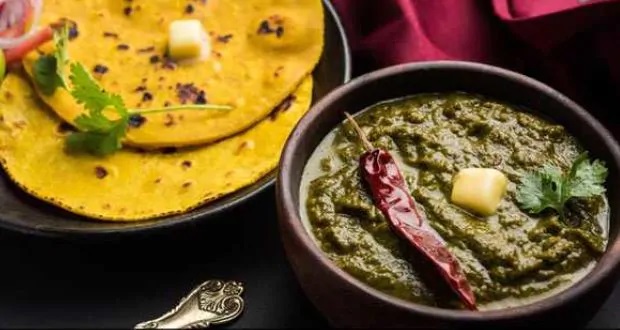Punjab
Punjabi cuisine is dominated by fresh produce, dairy and locally grown crops which are high in macro and micronutrients. Rural Punjab still follows the traditional style of cooking which includes chullah (stove in Punjabi) and bhatti (masonry oven). One of the distinct styles of cooking is using a tandoor (clay oven) from which come the famous dishes like tandoori chicken, tandoori paneer etc.
Common breakfast dishes are daliya (porridge) with milk, lassi with aloo paratha and butter. Most common lunch dishes are roti (flatbread made from wheat flour) with kaala chana (black chickpeas) and dahi (curd), rajma masala, Amritsari kulcha, kadhi and tadka dal. Dinner usually involves non vegetarian items made from chicken, fish and lamb. The most famous ones are chicken tikka, butter chicken, Amritsar macchi. Desserts in this region vary seasonally. In summers, kheer and falooda are savoured whereas in winters,gajar ka halwa and panjeeri are relished.
Punjab has a wide range of beverages which are majorly dairy-based. Lassi is one of the most famous summer drinks which can be either salty or sweet. Dining practices in Punjab are communal.
Sarson ka saag and Makki ki roti:
Sarhon da Saag (Sarso ka saag) is a popular winter dish. It is typically consumed with makki ki roti, gudd (jaggery), unprocessed white butter and salted lassi. During the harvest season, mustard fields are covered with sarson ke phool (mustard flowers) from which the green mustard leaves are used to make the saag. In the months of November to February, sarson ka saag is consumed with joy. It is made with palak (spinach) or bathua (white goose-foot) to add colour and thickness and is cooked with Indian spices and topped with a generous amount of desi ghee or white butter.
One of the most celebrated festivals in Punjab is Lohri. It marks the end of winter and the harvest of rabi (winter) crops like wheat, barley, mustard and peas. The festival is celebrated around a bonfire in which gudd-rewri, peanuts and popcorn are consumed. It is a tradition to eat gajjak (a sweet made of sesame seeds or peanuts and jaggery), sarson da saag and makki di roti and til rice (rice made with jaggery and sesame seeds) on the day of Lohri.
 Government of Indiaa
Government of Indiaa


 Recognizing the ongoing need to position itself for the digital future, Indian Culture is an initiative by the Ministry of Culture. A platform that hosts data of cultural relevance from various repositories and institutions all over India.
Recognizing the ongoing need to position itself for the digital future, Indian Culture is an initiative by the Ministry of Culture. A platform that hosts data of cultural relevance from various repositories and institutions all over India.
